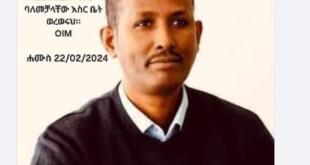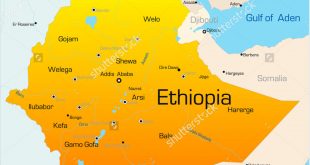OPINION By Ezekiel Gebissa
Addis Abeba — In his book, Moral Man and Immoral Society, Reinhold Niebuhr, the influential American theologian and ethicist, discusses the difficulty of achieving social justice through moral and rational means. Following Thomas Hobbes, Niebuhr argues that individual humans, suffering from the anxiety of knowing the finiteness of life, tend to rely on power and self-assured security as a means of protection against competitors.
This renders them incapable of considering the interest of others. While selfishness is thus an inescapable reality for both individual persons and human groups, Niebuhr reiterates, humans are endowed with unselfish impulse, which, when reason prevails over the instinct to survive, affords them the ability of self-transcendence, a measure of sympathy and a sense of justice.
The individual’s capacity to consider the interest of others, however, Niebuhr contends, does not directly transfer to human groups, which have less capacity than individuals do to consider the needs of others. Human groups or institutions effectively gather only the selfish impulses of the constituent individuals, not their capacities for unselfish consideration toward others and, therefore, find it virtually impossible to handle rationally the interests of competing individuals or subgroups. In sum, Neibuhr argues that, in every human group, there is “less reason to guide and to check impulse, less capacity for self-transcendence, less ability to comprehend the needs of others, therefore more unrestrained egoism than the individuals” (Neibuhr, 1932, pp. xi-xii). The collective egoism of individuals-in-groups happens to be overridingly more powerful that, when acting within institutions, concludes Niebuhr, the individual’s will-to-live becomes the will-to-power.
In this article, I analyze the OPDO’s performance during the recent state of emergency using the framework of Reinhold Niebuhr’s insight that makes a distinction between a person’s behavior as an individual and within a collective. I argue, following Niebuhr, that individual OPDO leaders and members may be committed to advancing Oromo nationalist goals but their party’s original raison d’etre restricts their ability to translate their dreams into practice. In other words, the individual members of the party have the capacity to transcend the party’s interests and subdue their own lust for power and wealth to serve the greater good of the Oromo cause. As a human institution, however, the party has no capacity for self-transcendence and for considering the interest of others.
Rebranding OPDO
Since the outbreak of the latest phase of the Oromo protest in 2015, the relationship between the Oromo People’s Democratic Organization (OPDO) and the Tigray People’s Liberation Front (TPLF) has been severely strained. As I wrote in the first part of this series, the protest exposed a bifurcated organization being pulled apart by the TPLF-loyalist old guard and the reformist new cohort within the OPDO. The first series of approaches–denial, resignation, despair–did not afford the party a return to relevancy and governing. During the state of emergency, the OPDO took the ensuing tranquility to revise its strategy of dealing with the new post-protest reality.
Accepting the reality that the protests were not a plot of a disgruntled diaspora, the OPDO sought to spring back to action by mimicking the activists in several ways. First, they elected a congenial and eloquent president of Oromia to sell to Oromos hope and promise of a new era of political reform, economic opportunities and improved quality of life for citizens. Second, the new group of leaders expropriated the language of Oromo nationalism to a point where observers suspected OPDO collusion with the opposition activists. Third, they came out displaying newfound techniques and adeptness in using social media not just to communicate but also to inspire, recruit and organize supporters for their cause. Under the state of emergency, the OPDO repositioned itself to bargain with the people.
Beyond parroting Oromo nationalists, the new OPDO leaders took certain actions to signal that they were using their power to address the main demands of the Oromo people, which triggered the protests in the first place. They announced that the Addis Abeba Integrated Development Master Plan (IDMP) is dead, the Oromia “Special Interest” law is in preparation, ill-gotten land is being recovered and jobs are being created for Oromo youth. It seemed the center of gravity of the Oromo cause had shifted to OPDO headquarters. For a fleeting moment, the OPDO seemed to have captured the imagination of Oromos as the new champions of Oromo nationalism who can lead the nation to freedom.
Notwithstanding the new leaders’ mastery of the art of nationalist grandiloquence, OPDO was discernably incapable of defending the gains of Oromo nationalism, much less implementing Oromo nationalist projects. In speeches made to various audiences, the new OPDO leader, Lemma Megersa, promised greater autonomy in decision-making, economic revolution, social justice and national renaissance. In practice, the OPDO can claim little in terms of responding to the demands of the Oromo protests or even meeting their own promises. The following are examples of the gap between the high-sounding rhetoric and the stark reality on the ground.
The first episode where OPDO’s difficulty in practice evinced was the incident I characterize as the qubee fiasco. This was a measure taken to change the order of the qubee alphabet and revise the Oromia elementary school curriculum, which was revealed by TV Oromiya. At first, the OPDO denied such a measure was ever taken at all. When the piling evidence made denial untenable, the president of Oromia referred the issue to a commission of experts to study it in depth and make recommendations. During the whole saga, it became clear that the OPDO was not even in charge of the region’s curriculum. Even the American embassy, which financed the study that ostensibly prompted curricular change, entered the fray to explain away curriculum change at regional state level. It was a surprise why the OPDO would even contemplate, much less implement, such a drastic change that would adversely affect Oromo politics and the Oromo psyche. Qubee is a mark of a generation, the signal symbol of the triumph of Oromo nationalism and the birth of a new Oromo nation. A genuine Oromo political organization wouldn’t tamper with the qubee for any reason. The OPDO showed clearly that the party takes order and implements them without question.
The qubee fiasco was followed by the “special interest” charade. In late April 2017, news that purported the Oromia regional state had developed a draft proclamation to determine Oromia’s special interest in Addis Abeba as the first step to begin implementation of Article 49 (5) of the Constitution. The draft law had a preamble that overawes even the ardent Oromo nationalist. The draft law itself contained practically no provision that clearly defined Oromia’s special interest in Finfinne. Instead, contrary to the intent of the constitutional provision, the draft law provided for a “special treatment” of any Finfinne resident who can claim an Oromo identity rather than spell out Oromia’s “special interest” with regard to administration, resource utilization and provision of social services as stipulated in the Ethiopian Constitution of 1995. On the very touchy issue of Addis Abeba’s boundary, the draft law indicated continued expansion of the city into Oromia. Despite OPDO’s claim, the Master Plan was not quite dead.
The draft law that was approved by the council of ministers and was presented to the national parliament was bereft of any provision that defined Oromia’s special interest. The bill granted Addis Abeba government’s power to determine what it is willing to doll out to Oromia as special benefits instead of granting Oromia regional state special rights in the administration of the city and sharing economic and social services benefits. Introduced three days before its annual recess, parliament did not have time to take up the bill for debate. It is not clear if it will take it up when it returns from recess. What is clear is the marginalization of the OPDO in defending Oromo interest against the TPLF and its associates. As inadequate as it was, OPDO’s initiative was set aside by the council of ministers in approving the draft law. In view of the fact that its priorities were flatly rejected by federal authorities, the OPDO seemed utterly irrelevant in any discussion at the national level in which the interest of Oromia are being considered.





